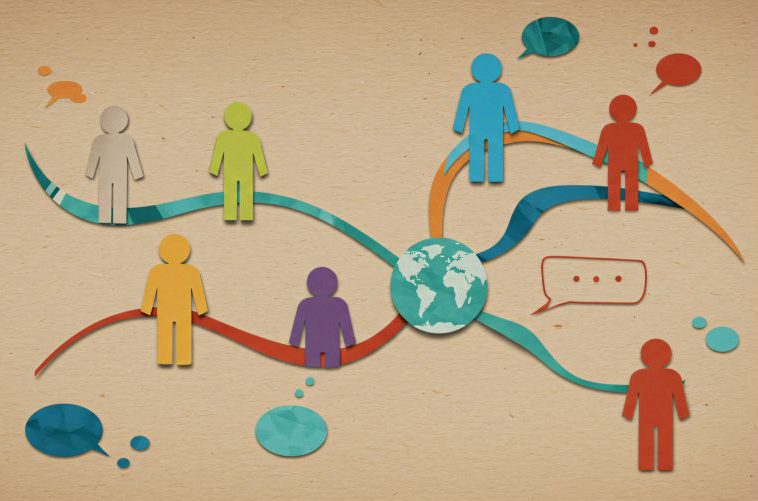
5 Benefits of Learning a Second Language in High School
Posted March 21, 2022, 3:15 pm by
What are the Benefits of Leaning a Second Language in High School?
When you’re sitting in class, do you ever wonder how what you’re learning is going to benefit you when you’re out of school? Well one place you don’t need to worry about this is in your foreign language classroom. The benefits of learning a second language are many, and doing so can pay off long after high school!
Whether you are studying Spanish or Mandarin, French or Arabic, learning a second language can bring more adventure, connection, opportunity and — yes — money into your life after you graduate. Here are just a few of the benefits you can experience from becoming bilingual.
1. Being Bilingual Opens Doors to International Jobs
One of the benefits of learning a second language is that it will help you land a job overseas. As business becomes increasingly global, an international assignment will be a great way to build your career. So which languages are most likely to advance your career if you want to work internationally?
We recommend the following:
- Spanish
- Portuguese
- Russian
- Mandarin
- Arabic
- German.
2. Learning a Second Language Can Help Digital Nomads
Maybe you don’t want to narrow down your dreams to settling down in one place — at least not for a while. If that’s the case, then the lifestyle of a digital nomad might be for you.
Digital nomads are people who don’t have to be in a certain location to do their work. They take advantage of that fact to explore the world.
Since digital nomads aren’t at an office working side by side with people who may have a different native language, you might not think it’s as important for them to learn a second language. However, we want to remind you of a couple of important things:
- As a digital nomad, you’re not as likely to have support getting settled into a new culture the way that someone who’s on an international assignment for a company would. One of the benefits of learning a second language then is to feel comfortable no matter where you end up. Things like securing a place to stay, learning how to get around, make a doctor’s appointment, etc., are entirely up to you to figure out. All of that is a lot easier when you speak the local language.
- Second, even if you’re staying in a country where a lot of people speak English, you’re going to have a more satisfying, meaningful and enlightening experience if you can communicate with the people around you in their own language. And isn’t that why you want to travel in the first place?
3. Language Fluency Helps Land U.S. Jobs
Even if you are more of a homebody than a globetrotter, learning a second language can still set you up for a brighter future.
According to New American Economy, a research and advocacy organization, there’s a growing demand for foreign language skills right here in the U.S. jobs market. After all, more than 67 million Americans speak a language other than English at home, the Center for Immigration Studies reports.
Businesses need bilingual employees to help serve the needs of their customers or clients who speak another language and to ensure that multilingual workforces can collaborate smoothly. Indeed, one of the nations leading job sites, lists a variety of careers where bilingual workers are needed, from nursing to human resources.
What foreign languages are most useful for U.S.-based jobs? The most-spoken non-English languages in the U.S. include:
- Spanish
- Mandarin
- Cantonese
- Tagalog
- Vietnamese
- Arabic
- French
- Korean.
4. Bilingual Workers Make More Money
Another one of the biggest benefits of learning a second language is that it will make you more money in the long run. Whether you decide to work in the U.S., abroad or some combination of the two, and whatever career path you choose, being bilingual is likely to help you bring home bigger paychecks. According to research reported in the Houston Chronicle, speaking another language can boost your pay by 2% to 20%.
5. Language Learning Boosts Your Brainpower
There’s one more benefit to becoming bilingual that you probably have not heard about. Learning a second language can actually help you succeed in your future studies or work in ways that don’t directly relate to speaking that language. Seriously!
Wondering why this is true? Well, as Knowable Magazine reports, researchers have found that being bilingual helps you manage your attention, focus on what’s important and successfully make plans. So, for example, learning Spanish doesn’t just help you land a dream job in Barcelona and make new friends while you’re there. It also helps you focus on your work without checking your phone and form a plan to reach your goals.
How to Learn A New Language Faster
All of that sounds pretty cool, right? So let’s talk about how you can make sure that all the time you are spending to master your second language will result in the kind of fluency you need to use that language in the real world.
Even if you have an awesome language teacher, you’ll also still need to take some steps outside of the classroom to truly build fluency. Don’t worry: We know you’re busy, so here are a couple of suggestions that should be pretty painless to fit into your day.
- Have conversations with native speakers of your second language. For example, with your teacher, with other students at your school, with your neighbors or at organized meet-ups for language students and native speakers. If you can’t connect with a native speaker in person, look for an online language buddy so that you can have conversations via Zoom.
- Participate in a summer program or gap year experience that specializes in language studies. There's all kinds of such opportunities right here on TeenLife, so be sure to check them out!
- Surround yourself with the language you are studying. For example, if you are learning Spanish, listen to music with lyrics and Spanish. Watch Spanish-language shows on Netflix, or revisit your old favorites with Spanish subtitles on or the dialogue switched to Spanish. Review vocabulary by using a language-learning app while you’re in the car. Every little bit of exposure to your target language counts!
Want to learn a language that isn’t taught at your school or spoken in your community? You can connect online with native-speaker instructors for virtually any language you’d like to study.
The benefits of learning a second language are nearly endless! No matter what your goals are after graduation, mastering a second language will open up a world of possibilities. Are you ready to seize them?
Blog Categories
- Career Advice
- College Admissions
- Colleges & Universities
- Financial Aid and Scholarships
- For Counselors
- For Parents
- For Students
- Gap Years
- Mental Health and Wellness
- Online Learning
- Performing and Visual Arts
- STEM Majors and More
- Summer Programs
- Teen Volunteering
- Trade & Vocational Schools
- Tutoring & Test Prep

Organization with listings on TeenLife? Login here
Register for Free
We’re here to help you find your best-fit teen-centered academic and enrichment opportunities.
Forgot Password
"*" indicates required fields








